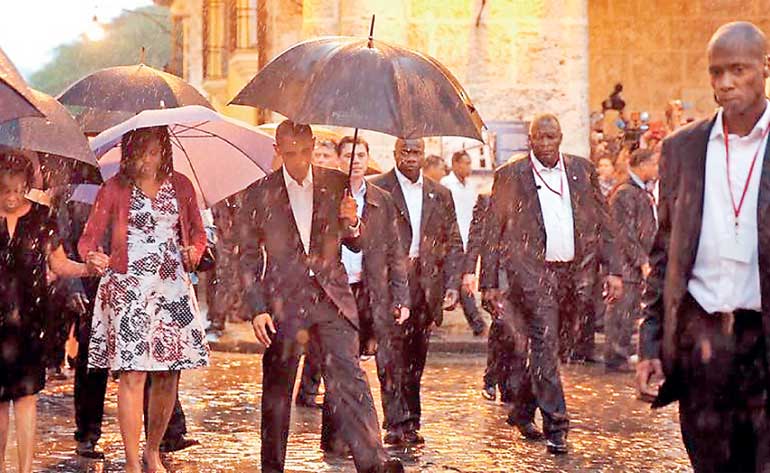Tuesday Feb 24, 2026
Tuesday Feb 24, 2026
Tuesday, 22 March 2016 00:02 - - {{hitsCtrl.values.hits}}
Reuters: President Barack Obama arrived to small but cheering crowds on Sunday at the start of a historic visit to Cuba that opened a new chapter in US engagement with the island’s Communist government after decades of hostility between the former Cold War foes.
The three-day trip, the first by a US president to Cuba in 88 years, is the culmination of a diplomatic opening announced by Obama and Cuban President Raul Castro in December 2014, ending an estrangement that began when the Cuban revolution ousted a pro-American government in 1959.
“It’s a historic opportunity to engage directly with the Cuban people,” Obama told staff at the newly reopened US Embassy who were gathered at a hotel, his first stop after arriving in the afternoon.
Groups of Cubans watched the motorcade from balconies and backyards as Obama was driven downtown, where a small crowd of Cubans braved a tropical downpour and tight security. They chanted: “Viva Obama, Viva Fidel,” as the president and his family left after eating dinner in a rundown neighbourhood.
 U.S. President Barack Obama tours Old Havana with his family at the start of a three-day visit to Cuba, in Havana 20 March, 2016 - REUTERS
U.S. President Barack Obama tours Old Havana with his family at the start of a three-day visit to Cuba, in Havana 20 March, 2016 - REUTERS
Obama, who abandoned a long-time US policy of trying to isolate Cuba, wants to make his policy shift irreversible even if a Republican wins the White House in the 8 November election.
But major obstacles remain to full normalisation of ties, and the Democratic president’s critics say the visit is premature. US officials concede the trip may not yield immediate concessions from Cuba on rights and economic freedom.
On Sunday, one bystander shouted: “Down with the blockade,” in reference to the US embargo in place for 54 years that remains the top irritant for Cubans. Obama, who responded to the shout by raising his right hand, has asked Congress to rescind the embargo but has been blocked by the Republican leadership.
Underscoring the ideological divide that persists between Washington and Havana, Cuban police, backed by hundreds of pro-government demonstrators, broke up the regular march of a leading dissident group, the Ladies in White, detaining about 50 people just hours before Obama arrived.
Obama arrived at Havana’s Jose Marti International Airport in Air Force One, the presidential jet with ‘United States of America’ emblazoned across its fuselage, a sight almost unimaginable not long ago on the island, just 90 miles (145 km) off the coast of Florida.
He was met by Cuban Foreign Minister Bruno Rodriguez, the top Cuban official present. The formal welcoming ceremony will be on Monday when Obama meets the Cuban president at the presidential palace.
US officials appeared unfazed by Castro’s absence from the airport welcome, even though he personally met and greeted Pope Francis in September. Republican presidential front-runner Donald Trump tweeted that Obama’s visit was a ‘big deal’ but that he got ‘no respect’.
Obama will hold talks with Castro – but not his brother Fidel, the revolutionary leader - and speak to entrepreneurs on Monday. He meets privately with dissidents, addresses Cubans live on state-run media and attends an exhibition baseball game on Tuesday.
The trip carries both symbolism and substance after decades of hostility between Washington and Havana.
Travelling with first lady Michelle Obama, her mother and their daughters, Sasha and Malia, Obama took in the sights of the colonial-era neighbourhood and was given a tour of Havana’s 18th century cathedral by Cardinal Jaime Ortega, who played a role in secret talks that led to the rapprochement 15 months ago.
The Obamas dined at the San Cristobal restaurant, run by an Afro-Cuban as part of a cautious opening to private enterprise since Fidel Castro handed power to his brother in 2008.
The trip makes Obama the first sitting American president to visit Cuba since Calvin Coolidge arrived on a battleship in 1928 and may help chip away at barriers to US-Cuba trade and travel.
Since rapprochement, the two sides have restored diplomatic ties and signed commercial deals on telecommunications and scheduled airline service.